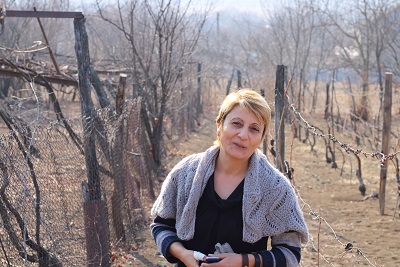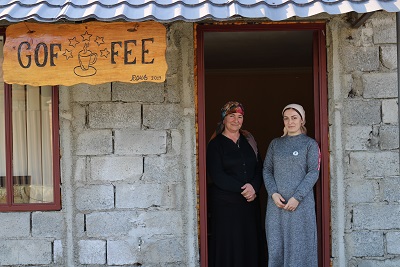Economically independent women for the empowerment of rural communities
Date:
This story has been originally published by UN Women Georgia.
Lali Gurgenidze lives in Asureti, a village in the Tetritskaro municipality of Kvemo Kartli region. Settled by winegrowing Germans in the nineteenth century, the village has preserved a unique variety of red grapes called “Asuretuli Shavi”, also known as “Shala”.

A nurse by vocation, Lali worked in a local hospital and, at the same time, made Shala wine following the traditional method. Seeing the latter’s economic potential, she decided to shed her uniform and fully dedicate her time to winemaking.
“This wine was a favourite of not only locals but also tourists visiting Asureti. I sold it in the village, but I always longed to expand the production and increase sales,” recalled Lali, who has breathed new life into Shala with UN Women support.
Through the project, Lali attended business trainings and obtained funding to bottle and brand her wine, “Gurgenidzeebis Marani” (Gurgenidze’s Cellar). She also received support to undertake a wine connoisseur course, which helped her upgrade her qualifications and brand her product. “I made my dream come true and by strengthening women entrepreneurs UN Women is strengthening families and communities too.” Lali intends to cooperate with stores and restaurants and sell them her wine, and she hopes to renovate the cellar and expand her production in Asureti.

Diana Imedashvili lives in Birkiani village, in the Pankisi Gorge of Kakheti region, and runs her own café that she opened with small savings and the assistance of the Enterprise Georgia. She recalled her journey: “I encountered numerous difficulties. I wanted to expand, but the lack of knowledge and finances prevented me from doing so. UN Women provided trainings that helped me understand my rights and obligations, develop relevant skills, learn bookkeeping and sort out my documents. I became more motivated and self-confident.”
Having received an additional grant from UN Women, Diana added a bakery to the café. She has many customers, but, as she recalls, getting started was not easy. Diana is also committed to supporting others by sharing her bookkeeping skills and her experience of starting her own business. “Through initiatives like this Pankisi women become not only economically active, but we also realize that we are able to do lots of useful things.” Diana is already a successful entrepreneur in the Pankisi Gorge, but she plans to continue improving her skills and expanding her business.
In 2019, within the framework of the UN Women project “Women’s Economic Empowerment in the South Caucasus" three target regions in Georgia - Kakheti, Kvemo Kartli and Samtskhe-Javakheti - 50 women, including Lali and Diana, were awarded business development grants, while another 24 received trainings, professional retraining and internships grants.
UN Women’s project partners are the Kakheti Regional Development Foundation, the Taso Foundation and CARE International in the Caucasus. The project is implemented in Georgia, Armenia and Azerbaijan with the financial assistance of the Swiss Agency for Development and Cooperation and the Austrian Development Cooperation. A key project goal is the economic empowerment of women, especially poor and socially marginalized women, and their enhanced involvement in decision-making processes. Participants in the project attend trainings and develop professional skills and new economic abilities that will help them in employment and self-employment.